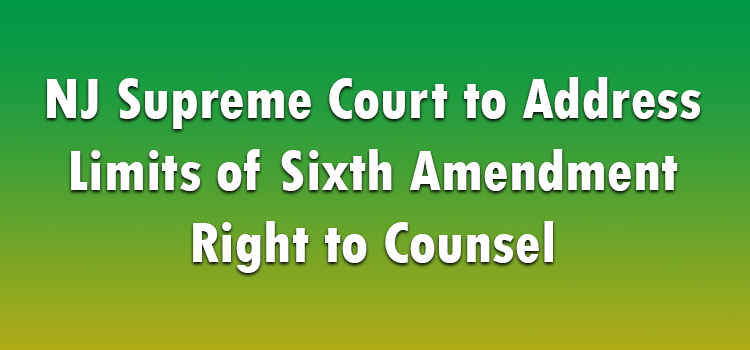The New Jersey Supreme Court recently granted certification in State v. Luis A. Maisonet. The case involves the extent of the right to counsel under the Sixth Amendment.
The Sixth Amendment, applicable to the states by virtue of the Fourteenth Amendment, ensures a defendant in a criminal prosecution shall enjoy the right to the assistance of counsel. The Sixth Amendment specifically requires the “assistance of counsel” for the accused “in all criminal prosecutions.”

The New Jersey Constitution includes similar guarantees. It states: “In all criminal prosecutions the accused shall have the right to a speedy and public trial by an impartial jury; to be informed of the nature and cause of the accusation; to be confronted with the witnesses against him; to have compulsory process for obtaining witnesses in his favor; and to have the assistance of counsel in his defense.”
Facts of the Case
On September 1, 2016, Defendant Luis Maisonet’s (Defendant or Maisonet) former girlfriend, Jennifer Villanueva, and her live-in boyfriend, Christopher Romero, drove to Atlantic City, where they worked at a mall. In the middle of that day, the Defendant walked into a clothing store managed by Romero and shot him. After Romero fell to the ground, the Defendant shot him two more times.
According to eyewitness testimony, after the Defendant shot Romero, he left the scene, crossed the street and walked into another clothing store where Villanueva was working. He retrieved the gun from the bag again, pointed it at Villanueva, said “bye-bye, baby,” and then fired the gun into the store ceiling before shooting himself. An off-duty police officer was able to move the gun away from the Defendant once he had fallen to the floor and reached for the gun again.
Maisonet was charged withfirst-degree murder; second-degree possession of a firearm for an unlawful purpose; second-degree unlawful possession of a weapon without a permit; and fourth-degree aggravated assault. His trial started in December 2017, approximately 15 months after the murder. On the first day of trial, as jury selection was due to commence, the Defendant requested an adjournment to retain private counsel. He expressed the concern that his then-current attorney, a public defender, lacked experience as she had “only two murder–two trials in her practice.”
However, the Defendant also conceded he had told his attorney, “if she could get me a deal, I’d go with her all the way to the end.” The trial judge informed the Defendant he had two choices: either hire his own attorney or represent himself. Defendant asked for time to call his family members to see if they could “get some money together” to hire private counsel. He did not mention the name of any particular attorney nor state any prior efforts he had made to retain private counsel. After listening to the Defendant’s concerns, the trial court denied the adjournment request, finding his public defender to be experienced and capable of representing him. It also observed that the Defendant had known about the trial date for a long period of time and knew who his attorney was.
Appellate Division Decision
The Appellate Division affirmed the Defendant’s conviction and sentence. In doing so, it rejected the Defendant’s argument that he was deprived of his constitutional right to counsel when the trial judge denied his request for a continuance to retain private counsel.
In reaching its decision, the court explained that the right to retain counsel of one’s own choice is not absolute. It “cannot be insisted upon in a manner that will obstruct an orderly procedure in courts of justice and deprive such courts of the exercise of their inherent powers to control the same.” State v. Furguson, 198 N.J. Super. 395, 401 (App. Div. 1985). Accordingly, a defendant who seeks to invoke the right to choose his own counsel “must diligently pursue that right and in the absence of such diligence, a trial court must be able to exercise control over its calendar.”
According to the Appellate Division, Maisonet had “offered no concrete financial plan for retaining private counsel nor did he mention a timetable for securing a private attorney.” Under those circumstances, it said, any continuance “would have been of indeterminate duration, with no assurance he could retain private counsel.”
Issues Before the New Jersey Supreme Court
The New Jersey Supreme Court granted certification on November 21, 2019. It has agreed to consider the following question: “Was defendant denied his constitutional right to counsel of his choice?”
Oral arguments have not yet been scheduled. Please check back for updates.
